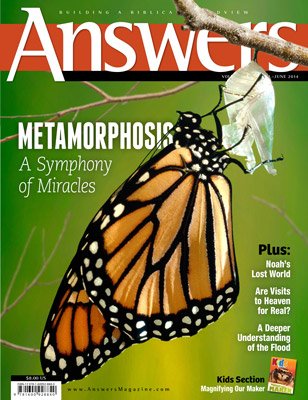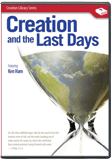
The Debate Has Changed
Biblical Worldview
Within the first three minutes of the Ken Ham vs. Bill Nye debate, it was obvious how radically the creation-evolution debate has changed since the 1970s and 1980s.
When Bill Nye “the Science Guy” quipped that creationism is not appropriate for children, the video went viral on YouTube. Ken Ham, president of Answers in Genesis, fired back a response, and the debate was on.
Eventually, a formal debate was announced, to be live streamed. The tickets for a seat at the event sold out within two minutes. On the day of the debate, millions of people linked in, and it became the top Twitter and Facebook trend of the day.
How times have changed!
During the heyday of creation-evolution debates in the 1970s and 1980s, none of this technology existed. The audiences attended brick-and-mortar buildings, or a few lucky people could tune into a local TV station.
Now anyone can join the debate live, and once it’s over, they can replay the whole thing at their convenience. Information is at our fingertips, instantly available in HD video.
More than technology has changed. The audience has changed, and so has our message. It’s no longer possible for Christians to assume common ground regarding the Bible and science.
Lessons from the Debate
During the debates of the 1970s and 1980s, Duane Gish, the “Creation Bulldog,” would dump a slew of facts on his opponents and overwhelm their defenses. The “Gish gallop,” as his detractors called it, focused on science. He typically brought up the second law of thermodynamics, gaps in the fossil record, and the probability of life appearing on earth. Gish avoided bringing up the Bible, intentionally.
After Ken Ham strode to the lectern, it soon became obvious how radically the debate has changed. Rather than loading the screen with scientific details, Ham went to the heart of the matter. He asserted that the debate is ultimately not about facts, but interpretations based on deeply held beliefs.
You could almost feel the ground shifting under Nye’s feet.
Historical vs. Observational Science
In the 1970s, creationists hoped to change the culture by the sheer weight of scientific facts. How successful were they?
Experience taught us a few things. Debates can’t go anywhere unless the opponents agree on basic terms. So Ham took a closer look at the vast difference between observational science—which builds spaceships and is observable and repeatable—and historical science.
Creationists love science, and many grew up watching Bill Nye’s show. (Ken Ham showed videos of four leading creation scientists, such as Raymond Damadian, the inventor of the MRI.) But science has limits when it comes to history.
Present-day, slow physical processes can’t fully explain the past, especially if the all-powerful Creator intervened in a one-time global judgment, like the Flood, which will never be repeated. If scientists base their interpretations on the present and ignore the only available eyewitness report, God’s Word, then they’re sure to go astray.
An Issue of Authority, Not Science
In the debate, Ken Ham first established that the battle is not about facts. “Creationists and evolutionists all have the same evidence. . . . the same dinosaur skeletons, the same animals, the same humans, the same DNA, the same radioactive decay elements.” It’s a battle over worldviews, not evidence.
His second point was that our investigation of the past depends on the right starting point. We have only two choices as our ultimate authority: God’s Word or man’s ideas. “Now I admit,” Ham said, “my starting point is that God is the ultimate authority. If someone doesn’t accept that, then man has to be the ultimate authority.” That’s really the issue.
“A Reasonable Man”—The Confessions of a Closed Mind
“The most defining moments in the debate came as Bill Nye repeatedly cited the ‘reasonable man’ argument in his presentation and responses. . . . He is a firm believer in autonomous human reason and the ability of the human intellect to solve the great problems of existence without any need of divine revelation. . . .
“The problem with human reason is that it, along with every other aspect of our humanity, was corrupted by the fall. . . . We have not lost the ability to know all things, but we have lost the ability to know them on our own authority and power. We are completely dependent upon divine revelation for the answers to the most important questions of life. Our sin keeps us from seeing what is right before our eyes in nature.”
—Dr. Al Mohler, president of Southern Baptist Theological Seminary
Without realizing it, Bill Nye confirmed Ham’s assertion. Nye later mocked the idea of trusting a book written “thousands of years ago,” and repeatedly claimed that he was his own authority, “as a reasonable man.”
Like most in our modern age, Nye assumes that human beings can reach conclusions untainted by personal bias. That’s a philosophically untenable position, but rampant today, engrained in children at school. This novel idea was birthed by modern skeptics who believed mankind can determine truth without God. Ken Ham called it the “religion of naturalism.”
Unless a person recognizes his commitment to naturalism, you won’t get anywhere debating “facts.” If the facts don’t seem to fit within his belief system, he’ll just keep seeking another way to make them fit.
Changing Minds, Changing Hearts
Neither side expected to “win” the debate. In fact, minutes before the debate started, a CNN journalist was wandering around the auditorium asking audience members on camera, “Do you expect to have your mind changed?” The answer was always the same.
Nye and his sympathizers are committed to their naturalistic worldview, regardless of the evidence. That became evident at the end of the debate, when the moderator asked a question from the audience: “What, if anything, would ever change your mind?”
Both men said, in essence, “Nothing.”
That’s a great question. It forces people to realize that “facts” are not the issue. The issue is our worldview—beliefs we choose to hold, for whatever reason, and refuse to change regardless of contrary evidence.
No Magic Bullets
How do you get past the roadblock of an antibiblical worldview?
Bill Nye repeated many popular “evidences” that supposedly prove an old earth, such as ice layers, tree rings, fossil layers, and distant starlight. He even said he’d be willing to change his beliefs about evolution and billions of years if Ham produced evidence to the contrary.
But the answers have already been available for years, and Ham had listed some of them earlier. Nye just ignored them.
It’s obvious that the issue was never the “best evidence.” We can pile up details from science—as creationist debaters have done for decades—but those alone don’t change minds.
Unless someone is willing to look at history from God’s perspective—the Bible—he won’t change. Indeed, he can’t. The Bible says, “The natural man does not receive the things of the Spirit of God, . . . nor can he know them
” (1 Corinthians 2:14). They are foolishness to him.
Long before the debate, many well-meaning Christians sent Ken Ham their favorite “silver bullet” that would crush the opposition. Such expectations miss the point. Bill Nye has a fundamentally different worldview, the religion of naturalism.
We face a philosophical and spiritual problem, not a scientific one.
The same conflict over worldviews drove Adam to rebel against God in the first place. He refused to trust God’s Word. The solution for people today is the same as it was then. Point people back to God’s Word, speaking in love and praying fervently.
We enjoy amazing technology. A slew of evidences are at our fingertips, never before available. Yet we can’t forget the basic need. Share our faith in God and His Word. After all, “faith comes by hearing, and hearing by the word of God” (Romans 10:17).
Answers Magazine
April – June 2014
A closer look at the Genesis Flood account reveals a beautifully written, unified narrative that points to one inspired author. The passage masterfully highlights one central message: “God remembered Noah.” Along with in-depth articles on the Flood, this issue shows biblical and historical evidences of Christ’s Resurrection, new discoveries about the miracle of a butterfly’s metamorphosis and much more!
Browse Issue SubscribeRecommended Resources

Answers in Genesis is an apologetics ministry, dedicated to helping Christians defend their faith and proclaim the good news of Jesus Christ.
- Customer Service 800.778.3390
- © 2024 Answers in Genesis







